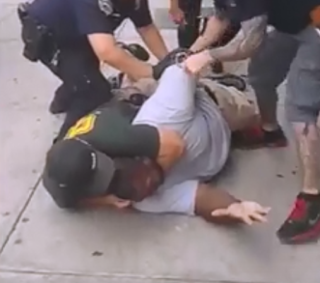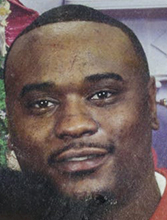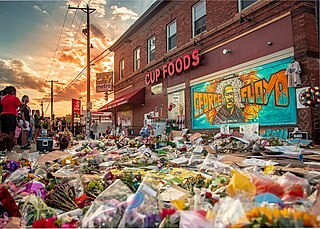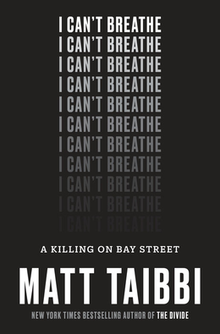
A die-in, sometimes known as a lie-in, is a form of protest in which participants simulate being dead. Die-ins are actions that have been used by a variety of protest groups on topics such as animal rights, anti-war, against traffic violence, human rights, AIDS, gun control, racism, abortion, and environmental issues. Often, protestors occupy an area for a short time instead of being forced to leave by the police.

Matthew Colin Taibbi is an American author, journalist, and podcaster. He has reported on finance, media, politics, and sports. A former contributing editor for Rolling Stone, he is the author of several books, former co-host of the Useful Idiots podcast, and publisher of the Racket News on Substack.

On July 17, 2014, Eric Garner, a 43-year-old African American man, was killed in the New York City borough of Staten Island by Daniel Pantaleo, a New York City Police Department (NYPD) officer, after the latter put him in a prohibited chokehold while arresting him. Video footage of the incident generated widespread national attention and raised questions about the use of force by law enforcement.

"Hands up, don't shoot", sometimes shortened to "hands up", is a slogan and gesture that originated after the August 9, 2014, police shooting of Michael Brown in Ferguson, Missouri, and then adopted at protests against police brutality elsewhere in the United States. The slogan implies one has their hands in the air, a common sign of submission, and is therefore not a threat to an approaching police officer. Witness reports from the Brown shooting are conflicted as to what Brown was doing with his hands when he was shot. One witness claimed Brown had his hands in the air before being killed, which was the basis for the slogan.
"I can't breathe" is a slogan associated with the predominantly American political movement Black Lives Matter, particularly with the killings of Eric Garner and George Floyd by police, as well as with broader issues of police brutality and racial inequality.

On December 20, 2014, Ismaaiyl Abdullah Brinsley shot and killed Rafael Ramos and Wenjian Liu — two on-duty New York City Police Department (NYPD) officers — in the Bedford–Stuyvesant neighborhood of Brooklyn. Brinsley then fled into the New York City Subway, where he killed himself. Earlier in the day, before he killed Ramos and Liu, Brinsley had shot and wounded his ex-girlfriend Shaneka Thompson in Baltimore after initially pointing the gun at his own head.

Erica Garner-Snipes was an American activist who advocated for police reform, particularly in the use of force during arrests. Garner became involved in activism following the 2014 murder of her father, Eric Garner, after a New York City police officer placed him in a lethal chokehold during an arrest.
Ramsey Orta filmed the killing of Eric Garner in New York City on July 17, 2014. His video spurred protests and debate over city police procedure. Following a campaign of police harassment after the video went viral, in 2016 he was sentenced to four years in prison for weapons and drug charges after accepting a plea deal for which the prosecutor agreed to drop charges against his mother. He was released in May 2020.
Carnell Russ was a 24-year African American mill worker killed by white Star City, Arkansas police officer Charles Lee Ratliff on Memorial Day, May 31, 1971. Russ' death led to a change in federal law regarding the future prosecution of civil rights cases.

"I can't breathe" is a slogan associated with the Black Lives Matter movement in the United States. The phrase originates from the last words of Eric Garner, an unarmed man who was killed in 2014 after being put in a chokehold by a New York City Police Officer. A number of other Black Americans, such as Javier Ambler, Manuel Ellis, Elijah McClain, and George Floyd, have said the same phrase prior to dying during similar law-enforcement encounters. According to a 2020 report by The New York Times, the phrase has been used by over 70 people who died in police custody.
This is a list of protests brought on by the murders of Breonna Taylor and George Floyd in Kentucky, United States. In 2020, there were protests throughout Kentucky in reaction to the shooting of Breonna Taylor and murder of George Floyd by police, as well as the shooting of David McAtee by the Kentucky Army National Guard. The demonstrations happened regularly in the largest cities in Kentucky, including Louisville and Lexington. Many of the smaller cities had protests on at least one day.
This is a list of protests in Oklahoma related to the murder of George Floyd.

Gwen Carr is an American activist, public speaker, and author. Carr's son, Eric Garner, was killed by a New York Police Department officer who used a prohibited chokehold to arrest Garner. Since her son's death, Carr has become active in police reform in the United States, including as a member of Mothers of the Movement and a voice in the Black Lives Matter movement.

On March 28, 2019, Javier Ambler II died while being arrested by police in Austin, Texas, after fleeing from deputies who sought to stop him for a traffic violation. Ambler was tased multiple times by authorities. Video of Ambler's death, recorded by police officers, was obtained and released by news organizations in June 2020. During the arrest Ambler repeatedly stated "I can't breathe" and "please save me" before dying. Ambler's death was recorded by a Live PD television crew, and the recording has since been destroyed, according to A&E Networks.

The Black Lives Matter movement has been depicted and documented in various artistic forms and mediums including film, song, television, and the visual arts. In some instances this has taken place in the form of protest art. These cultural representations have also grown organically among artists who seek to partake in activist efforts in support or in recognition of the Black Lives Matter movement. The themes conveyed in these artistic works address the history of racism and injustice toward people of color in the United States and typically express sentiments of anger and fear as well as solace and hope.

"I Can't Breathe" is a song by H.E.R. released on June 19, 2020. It was written by H.E.R., D'Mile and Tiara Thomas and produced by D'Mile. It reached number 20 on Billboard's Hot R&B Songs. The song won Song of the Year at the 63rd Annual Grammy Awards, serving as H.E.R.'s first ever win in this category.

"I Can't Breathe" is the debut single by Australian rapper Jerome Farah, released on 26 June 2020 through Sony Music Australia. The song discusses racism and police brutality.
The BREATHE Act is a proposal for a federal omnibus bill, presented by the Electoral Justice Project of the Movement for Black Lives. The bill proposes to divest taxpayer dollars from policing and invest in alternate, community-based approaches to public safety.

New York City has been the site of many Black Lives Matter protests in response to incidents of police brutality and racially motivated violence against black people. The Black Lives Matter movement began as a hashtag after the shooting death of African-American teen Trayvon Martin, and became nationally recognized for street demonstrations following the 2014 deaths of two African Americans, Michael Brown and Eric Garner. Garner was killed in the Staten Island borough of New York City, leading to protests, demonstrations, and work towards changes in policing and the law. Following the murder of George Floyd in Minnesota in 2020, the global response included extensive protests in New York City, and several subsequent changes to policy.













